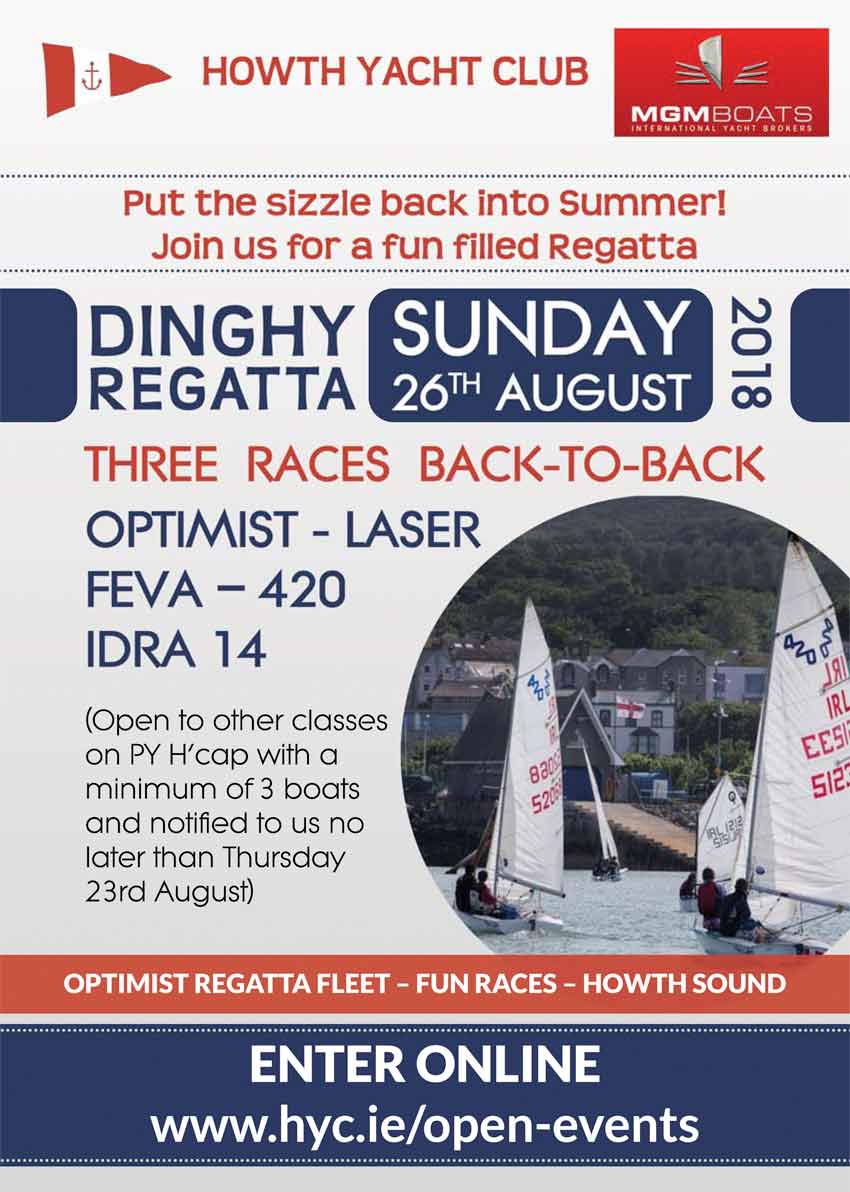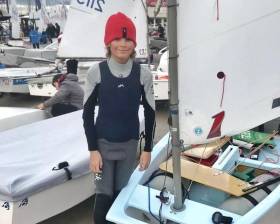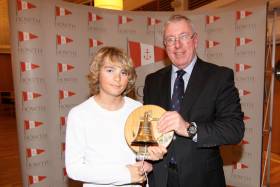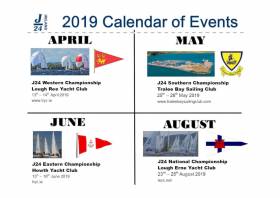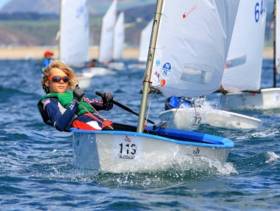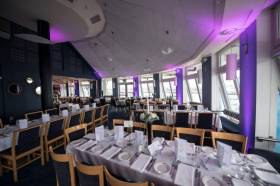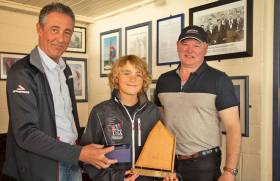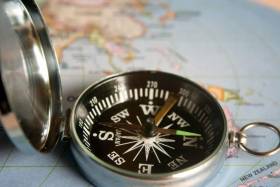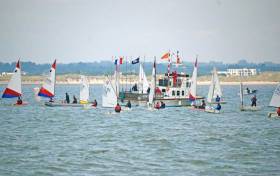Displaying items by tag: HYC
Impressive Speeds From Lasers Racing In Howth
Two races were sailed by the Lasers at Howth Yacht Club on Sunday 10 February in demanding conditions, writes Dave Quinn.
We had westerly winds against a flooding tide, which generated a small but steep chop. Absolutely brilliant for reaching, but somewhat tougher upwind.
It was probably the fastest your correspondent has ever gone in a Laser. Winds were averaging 20 knots and gusting to 28.
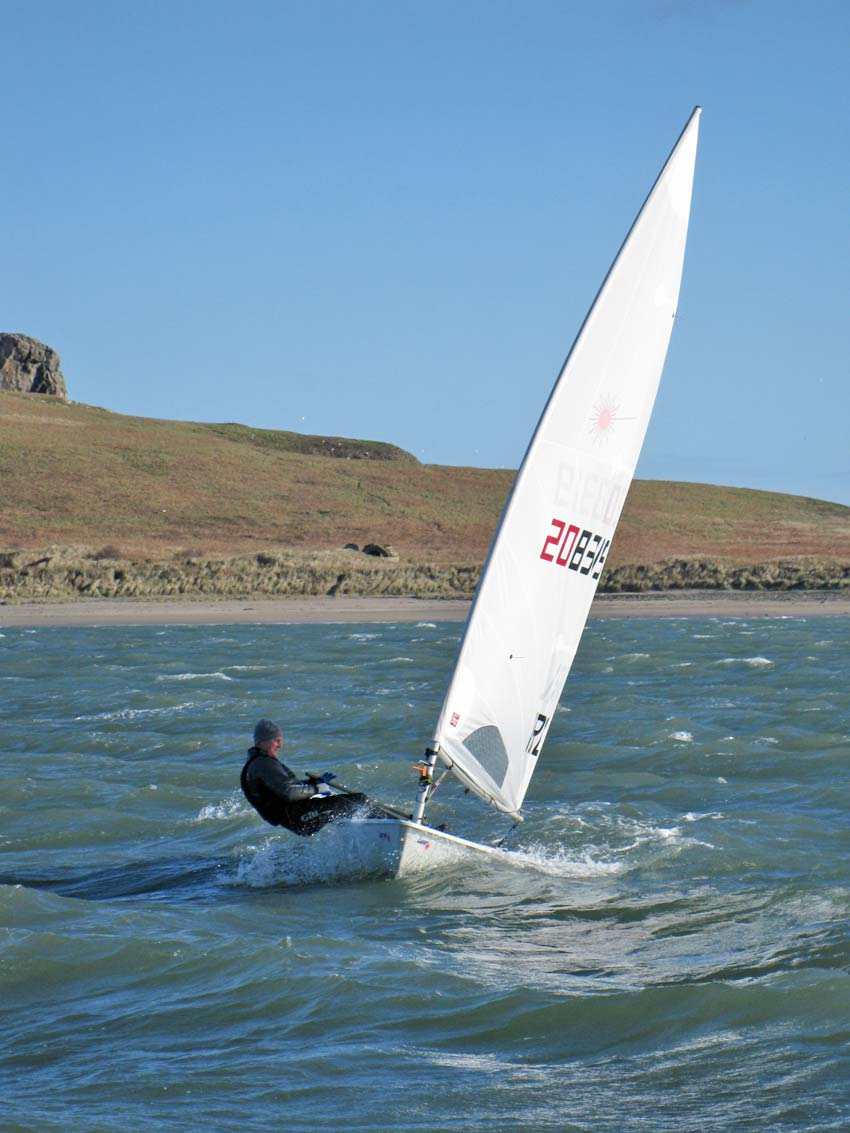
The first race was sailed over a lap-sausage-lap of a triangular course with the run and the gybe marks being where most capsizes occurred.
The race management team took pity on the fleet and changed to triangles without a run for the second race and, in recognition of the number of competitors who were swimming rather than sailing during that race, the course was shortened after just two laps.
The fleet was still left with a broad reach back to the sanctuary of the harbour, which gave further opportunity for some more Sunday morning swimming but all survived and there were plenty of tall tails to be told in the bar afterwards.
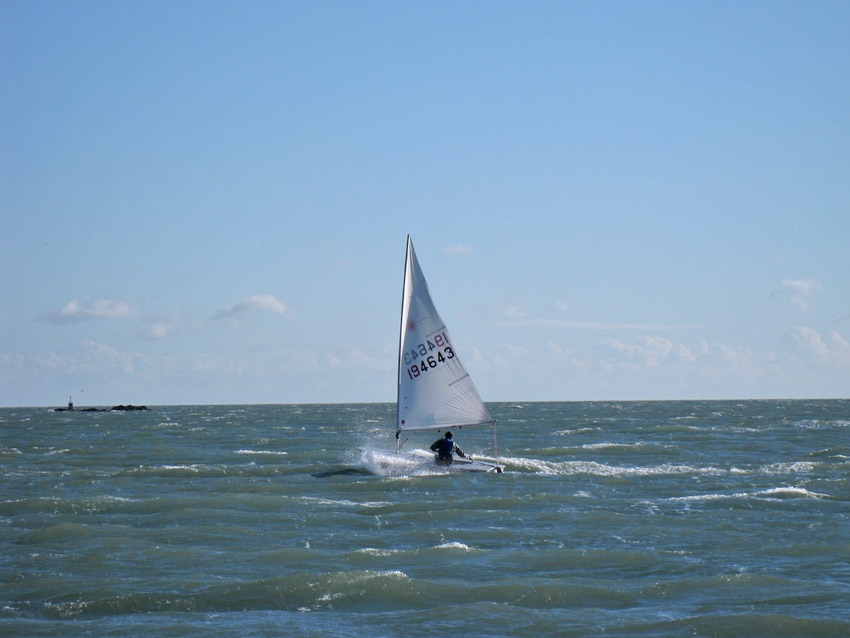
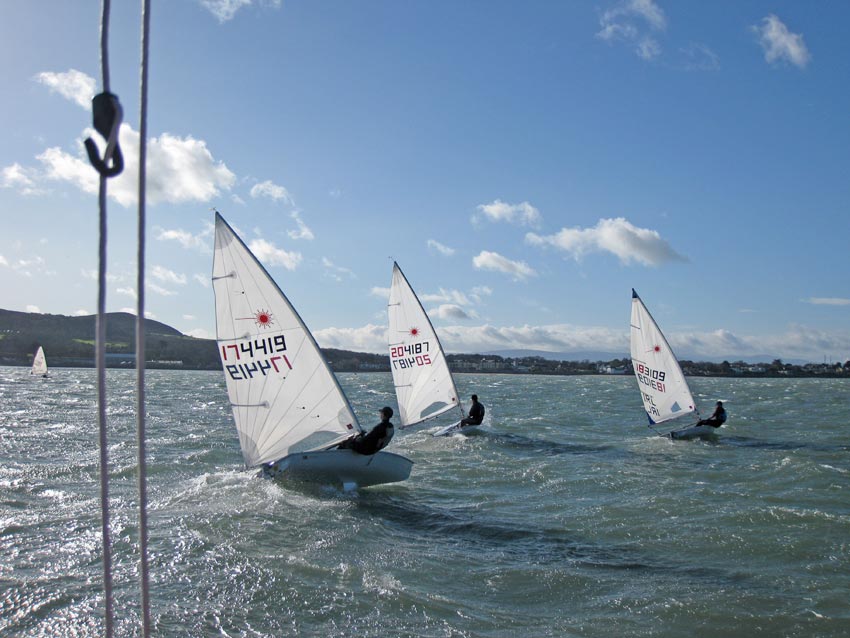
Daragh Kelleher won both races in the Standard Rig, and Tom Fox showed some impressive speed to beat most of the standard rigs on his way to winning the Radial fleet. Sophie Kilmartin continued her winning ways also with two wins in the 4.7 fleet.
The impressive speeds on the reaches were vouched for by the Sailracer GPS trackers fitted to the boats for the event, confirming that over 14 knots can readily be achieved in a Laser, albeit not a comfortable situation to be in with the gybe mark approaching fast.
Howth Yacht Club’s Rocco Wright continues his outstanding run of form at the Trofeo Euromarina Optimist in Torrevieja, going into the penultimate day in second place overall.
The winner of the Seaward Bell Trophy in last week’s HYC Achievers Awards placed first in his first and fourth qualifiers in the Red group, with a second-place finish in the third and a black flag for race number two.
In the current tally (as of Friday 25 January) that puts Wright just one net point behind table-topper Marco Gradoni from Italy, and three ahead of Spanish youth Jaime Ayarza Montenegro.
Five other Irish juniors are competing in the south-eastern Spanish Mediterranean port this week, with James Dwyer Matthews (Kinsale YC) closest in 11th overall.
Ben O’Shaughnessy (Royal Cork YC), Clementine Van (National YC), Jessica Riordan (Royal St George YC) and Lucia Cullen (RStG/NYC) make up the rest of the Irish Optimist contingent.
Howth Yacht Club Acknowledges Its Best Achievers Of 2018
#HYC - Saturday night (19 January) saw Howth Yacht Club’s annual Achievers Awards to recognise those who have gone above and beyond for the club in the previous year.
Junior sailor Rocco Wright was one of the stars of the evening, receiving the Seaward Bell Trophy for excelling in events both at home and abroad.
Wright’s category included Eve McMahon, Luke Turvey, Johnny Flynn and Jamie McMahon — all exemplars of the calibre of junior racing talent at the club today.
On the same note, the GM Award for the sailor or sailors who best represent and enhance the spirit of junior sailing went to the Scott girls Hannah, Sarah and Lucy for their enthusiasm — which included the daunting task of saving on Ian Malcolm’s Howth 17.
The Howth 17 class itself took the Cliona Murphy Memorial Trophy that encapsulates the spirit of the club as a whole, dedicating time and effort to a specific goal in which the club can take pride.
In other awards, Diarmuid Brodie was named Instructor of the Year for his outstanding service to HYC members over the previous 12 months, while Sarah Robertson was rewarded for her efforts with the Volunteer of the Year gong.
Dave Cullen and team on Checkmate XV were named Boat of the Year after wins in all three Dun Laoghaire regattas, their overall wins in the inaugural Wave Regatta and the Half Ton Classics Cup.
And the Silver Fox Trophy for excellence in racing, cruising or organisation went to the junior 49er world champion pair of Robert Dickson and Sean Waddilove, winning out over Colin Kavanagh and the most recent Irish Sailor of the Year Conor Fogerty.
Lough Ree, Tralee Bay, Howth & Lough Erne To Host J/24 Championships In 2019
The J/24 Association of Ireland has announced the calendar for its regional and national championships in 2019.
Lough Ree Yacht Club will host the class for its Westerns in the first big event of the year on the weekend of 13-14 April — the week before Easter.
The following month the fleet moves to Tralee Bay Sailimg Club for the Southerns on 25-26 May.
Howth Yacht Club will host the Eastern Championship on 15-16 June, and the Nationals on 23-25 August will be sailing out of Lough Erne Yacht Club.
Try Sailing At Howth Yacht Club’s Open Day Next Monday
#HYC - The doors of Howth Yacht Club will be open next Monday 22 October to anyone curious to try sailing or boating in North Co Dublin.
HYC will be one of many clubs across Ireland holding open days to show off what they do as part of Join A Club Week with the Ray D’Arcy Show on RTÉ Radio 1.
The clubhouse at Howth Harbour’s Middle Pier will be open to all from 10am on Monday, and HYC looks forward to seeing you there.
Date & Venue Confirmed For 2019 Optimist Nationals
#Optimist - Howth Yacht Club will host the 2019 Optimist National and Open Championships between 15 and 18 August, the International Optimist Dinghy Association Ireland has announced.
The association added that it is still in the process of finalising dates and venues for the rest of the 2019 calendar but will make announcements as soon as possible on the IODAI website and Facebook page.
Book Your Place At Howth Yacht Club’s Autumn League Final Banquet
#HYC - Be sure to reserve your place for the KBC Autumn League final night banquet hosted by Howth Yacht Club on Saturday 20 October.
The venue is also available for Christmas parties this upcoming festive season — with room to host up to 150 guests for a tailored three-course dinner or a more casual alternative.
For details contact the clubhouse at 01 832 2141 or email [email protected].
Howth Sailors Top 2018 Oppy Rankings After Strong Season Finish On Tralee Bay
#Optimist - Howth Yacht Club have congratulated youth members Luke Turvey and Rocco Wright for topping the senior and junior tables respectively in the final 2018 rankings in Ireland’s Optimist class.
Turvey is in fine company in the senior fleet, ahead of Justin Lucas; James Dwyer-Matthews; Rian Geraghty-McDonnell, Ireland’s top performer at last week’s Oppy Worlds in Cyprus; and Sam Ledoux, who beat him on count back to win the senior Gold fleet at the IODAI Munster Championships last weekend.
Fellow Howth and NYC youth Wright, meanwhile, sailed a solid event with five bullets at Tralee Bay Sailing Club in Fenit, which saw a tough weekend of shifty conditions.
And in another win for Howth, the Fair Sailing Award went to Johnny Flynn.
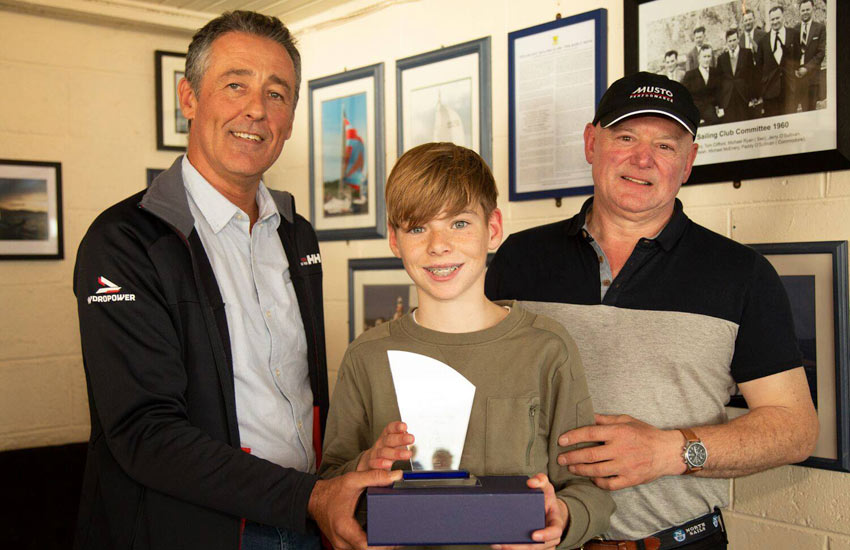 Luke Turvey was second overall in the Senior fleet | Photo: Paul-Michel Ledoux
Luke Turvey was second overall in the Senior fleet | Photo: Paul-Michel Ledoux
2018 IODAI Munster Championships Results
Junior Fleet Gold
- 1st Rocco Wright HYC
- 2nd Jessica Riordan RStGYC
- 3rd Ben O’Shaughnessy RCYC
- 4th Billy Doyle TBSC
- 5th Peter Williams RStGYC
Junior Fleet Girls
- 1st Jessica Riordan RStGYC
- 2nd Alana Twomey RCYC/CHSC
- 3rd Clementine van Steenberge NYC
Junior Fleet Silver
- 1st Sorcha Gannon O’Connor HYC
- 2nd William Walsh TBSC
- 3rd Conall Mac Thrinfhir TBSC
- 4th Harry Moynan RCYC
- 5th Hugo Crawford HYC
Top Local Sailor – Junior Fleet
- Billy Doyle TBSC
Senior Fleet Gold
- 1st Sam Ledoux NYC
- 2nd Luke Turvey HYC
- 3rd James Dwyer Matthews RCYC
- 4th Fiachra McDonnell NYC
- 5th Trevor Bolger RStGYC
Senior Fleet Girls
- 1st Eimer McMorrow-Moriarty TBSC
- 2nd Lauren O’Callaghan NYC
- 3rd Grace Fahy RStGYC/LDYC
Senior Fleet Silver
- 1st Liam Duggan RCYC
- 2nd Fleet Ciara Paul MYC
- 3rd Clodagh Malone NYC
Top Local Sailor – Senior Fleet
- Eimer McMorrow-Moriarty TBSC
Essential Navigation & Seamanship Course At Howth Yacht Club
#HowToSail - Next month Howth Yacht Club will host a two-day course on essential navigation and seamanship for cruising in coastal waters.
Run on Saturday 13 and Sunday 14 October, the course is touted as the ideal introduction to the essential knowledge required to plan and safely undertake short cruising passages in coastal waters.
The "concise yet highly informative" course is geared towards skippers and crew who are new to cruising, but is equally suitable for sailing yachts, motorboats, RIBs, divers and sea anglers.
The course will include:
- Charts and chart work
- Safety
- Navigation buoys and lights
- ‘Rules of the Road’
- Tides
- Weather
- Passage planning and pilotage
- Modern methods of electronic navigation
Presented by David Jerrard of Sea-Craft, the course runs from 9.30am to 5.30pm each day in HYC. The course fee is €120 which includes the full course pack and documentation.
The course is open to both club members and non-members so feel free to bring along a friend or colleague.
For more details and booking information, contact [email protected] or phone Sea-Craft at 01 286 3362 anytime.
MGM Boats Supports Howth Yacht Club’s Dinghy Regatta This Sunday
#HYC - Howth Yacht Club’s annual Dinghy Regatta, sponsored by MGM Boats, takes place this Sunday 26 August.
Three races will be held back-to-back for Optimists, Lasers, RS Fevas, 420s and IDRA 14s, as well as other classes on PY handicap and with a minimum of three boats.
For full details see the HYC website HERE.
